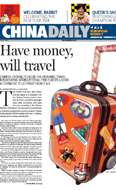Taliban reject talks again, violence soars
Updated: 2010-11-16 06:33
(Agencies)
KABUL - The Taliban in Afghanistan remain utterly opposed to peace talks despite slow progress toward reconciliation, their leader said on Monday after NATO forces suffered their worst losses in months in a spike in violence.
Mullah Mohammad Omar, the secretive, one-eyed leader of the Afghan Taliban, issued a statement just four days before NATO leaders will gather for a summit in Lisbon where Afghanistan will be the top of the agenda.
Violence across Afghanistan was already at its worst since the Taliban were ousted by U.S.-backed Afghan forces in late 2001 but a dramatic increase in attacks in the past four days will be a sobering message for NATO leaders.
Military and civilian casualties are at record levels and while both sides have been talking up recent success on the battlefield, there is growing acceptance of the need for a negotiated settlement to the conflict.
Omar reiterated that would not be possible until all foreign troops -- now at about 150,000 -- left Afghanistan, labeling talk of negotiations "mere propaganda."
"The cunning enemy which has occupied our country is trying, on the one hand, to expand its military operations ... and, on the other hand, wants to throw dust in the eyes of the people by spreading the rumors of negotiation," Omar said in a statement.
Afghan President Hamid Karzai has included eventual talks with the Taliban as part of a wider reconciliation plan but Afghan and U.S. officials have played down confused and unconfirmed reports about talks with high-level insurgents, saying any contacts so far have only been preliminary.
Karzai's peace plan also will be addressed in Lisbon, with Afghanistan setting the ambitious target of 2014 for its forces to take over complete security responsibility.
U.S. President Barack Obama plans to begin a gradual drawdown of U.S. forces from July 2011. The chance of talks and the recent surge in violence also will play on his mind when he reviews his Afghanistan war strategy next month.
Many European NATO leaders are under pressure from an increasingly sceptical public to justify their continued support for the costly and drawn-out conflict.
In a weekend interview with The Washington Post, Karzai left little doubt that he thought it was time for foreign troops to begin cutting back on operations and reducing their visibility.
The interview also underscored his often uneasy relationship with Washington, which Karzai described as "grudging," although his office tried to smooth over the appearance of division.
"The relationship is maturing, the room for substantive reflection on both sides is widening, and this is something that is going to take us to another level of partnership," Karzai's spokesman, Waheed Omer, told reporters.
Karzai is thought to have an uneasy relationship with U.S. General David Petraeus, the overall commander of foreign troops in Afghanistan and author of the counterinsurgency strategy.
Omer said Karzai was not a critic of the overall strategy but had voiced his views on how it could be improved.
In the interview, Karzai said the United States should end U.S. Special Operations forces night raids, a part of Petraeus' counter-insurgency strategy, saying they are a serious cause of Afghan disenchantment with NATO and with his own government.
In Washington, U.S. Secretary of State Hillary Clinton said she shared Karzai's concerns but saw the raids as necessary.
"There is no question that they are having a significant impact on the insurgent leadership and the networks that they operate," she told reporters, arguing that they were in the interest of Afghanistan's people, government and NATO forces.
Corruption, Bribes
Endemic corruption in Afghanistan has badly damaged Karzai's relationship with his Western backers, leaving them to question whether they are dealing with a credible partner, another issue that will be considered in Lisbon.
Karzai won a fraud-marred election last year and there still are no final results from September 18 parliamentary elections after thousands of complaints were filed.
The U.N.-backed Electoral Complaints Commission said it had finished verifying 2,495 complaints that could affect the outcome and would send its findings to election officials so final results could be announced as soon as possible.
Afghan officials have called the election a success despite almost a quarter of the votes cast being thrown out as tainted. Scores of candidates have alleged bribe-taking or fraud by election officials and called for a new poll.
International observers have been more cautious, saying it was remarkable the vote was conducted at a time of war but also noting there had been "considerable fraud."
With no new parliament on the immediate horizon, Karzai's government still has a shaky look and some ministries still are being run by caretakers.
At the same time, there seems little hope of an immediate end to the violence. The NATO-led
International Security Assistance Force said on Monday five of its troops had been killed in a clash with insurgents in the east on Sunday, its worst loss in a single incident in six months.
At least 645 have been killed so far in 2010, by far the deadliest year of the war.
Also on Monday, the Taliban said it had fired rockets at an ISAF base in eastern Kunar province, setting ablaze a huge fuel container. In the north, nine police and militia and eight insurgents were killed in a pitched gunbattle in Kunduz.
E-paper

Car sharing helps ease holiday woes
Many car owners offering paid lift services during the Spring Festival rush to reduce their own costs of driving home.
Global marketplace
Right on cue
Welcoming the rabbit
Specials

China Daily in Europe
China Daily launched its European weekly on December 3, 2010.

The Confucius connection
Ancient sage's wisdom helps Chinese students prepare for a more modern, global future.

Welcome the rabbit
Our far-flung writers show how the New Year is celebrated in Australia, India, Malaysia, Australia, Philippines, Singapore, Thailand, Vietnam.
